2015届江西省上高二中高三上学期第四次月考 英语
江西省上高二中2015届高三上学期第四次月考 文综地理 Word版含答案
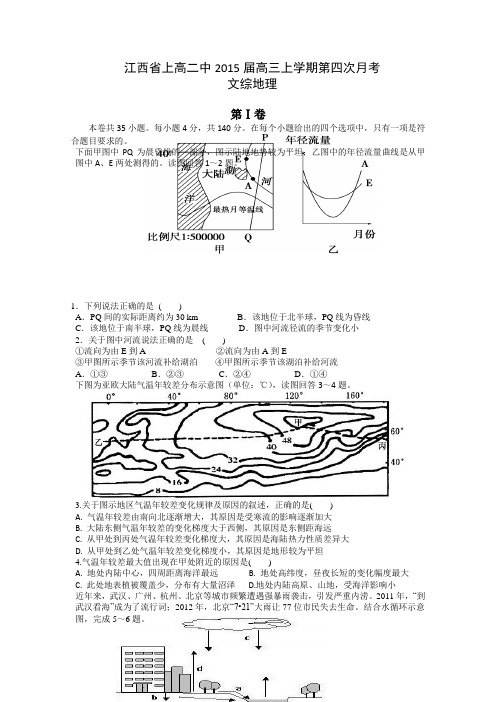
江西省上高二中2015届高三上学期第四次月考文综地理第Ⅰ卷本卷共35小题。
每小题4分,共140分。
在每个小题给出的四个选项中,只有一项是符合题目要求的。
下面甲图中PQ为晨昏线的一部分,图示陆地地势较为平坦;乙图中的年径流量曲线是从甲图中A、E两处测得的。
读图回答1~2题。
1.下列说法正确的是( )A.PQ间的实际距离约为30 km B.该地位于北半球,PQ线为昏线C.该地位于南半球,PQ线为晨线D.图中河流径流的季节变化小2.关于图中河流说法正确的是( )①流向为由E到A②流向为由A到E③甲图所示季节该河流补给湖泊④甲图所示季节该湖泊补给河流A.①③B.②③C.②④D.①④下图为亚欧大陆气温年较差分布示意图(单位:℃),读图回答3~4题。
3.关于图示地区气温年较差变化规律及原因的叙述,正确的是( )A. 气温年较差由南向北逐渐增大,其原因是受寒流的影响逐渐加大B. 大陆东侧气温年较差的变化梯度大于西侧,其原因是东侧距海远C. 从甲处到丙处气温年较差变化梯度大,其原因是海陆热力性质差异大D. 从甲处到乙处气温年较差变化梯度小,其原因是地形较为平坦4.气温年较差最大值出现在甲处附近的原因是( )A. 地处内陆中心,四周距离海洋最远B. 地处高纬度,昼夜长短的变化幅度最大C. 此处地表植被覆盖少,分布有大量沼泽D.地处内陆高原、山地,受海洋影响小近年来,武汉、广州、杭州、北京等城市频繁遭遇强暴雨袭击,引发严重内涝。
2011年,“到武汉看海”成为了流行词;2012年,北京“7•21”大雨让77位市民失去生命。
结合水循环示意图,完成5~6题。
P5.造成市区内涝严重的主要原因是( )A.排水设施不足导致a 环节受阻B.城市化导致b 环节增强C.全球变暖导致c 环节减弱D.热岛效应导致d 环节增强 6.为降低城市内涝的影响,下列做法不合理的是( )A.建立完善城市防洪预警机制B.扩大城市规模,增加道路面积C.合理规划城市排水系统D.城市建设中尽可能保护天然池塘、河道图1为土耳其棉花堡景观。
江西省上高二中高三英语上学期第一次月考
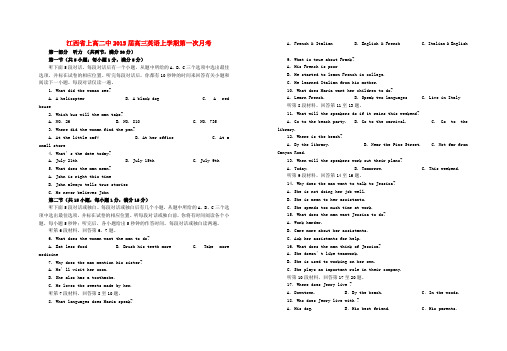
江西省上高二中2015届高三英语上学期第一次月考第一部分听力(共两节,满分30分)第一节(共5小题;每小题1分,满分5分)听下面5段对话。
每段对话后有一个小题,从题中所给的A. B. C三个选项中选出最佳选项,并标在试卷的相应位置。
听完每段对话后,你都有10秒钟的时间来回答有关小题和阅读下一小题。
每段对话仅读一遍。
1. What did the woman see?A. A helicopterB. A black dogC. A red house2. Which bus will the man take?A. NO. 26B. NO. 810C. NO. 7353. Where did the woman find the pen?A. At the little caféB. At her officeC. At a small store4. What’s the date today?A. July 21thB. July 15thC. July 9th5. What does the man mean?A. John is right this timeB. John always tells true storiesC. He never believes John第二节(共15小题,每小题1分,满分15分)听下面5段对话或独白。
每段对话或独白后有几个小题,从题中所给的A、B、C三个选项中选出最佳选项,并标在试卷的相应位置。
听每段对话或独白前,你将有时间阅读各个小题,每小题5秒钟;听完后,各小题给出5秒钟的作答时间。
每段对话或独白读两遍。
听第6段材料,回答第6、7题。
6. What does the woman want the man to do?A. Eat less foodB. Brush his teeth moreC. Take more medicine7. Why does the man mention his sister?A. He’ll visit her soon.B. She also has a toothache.C. He loves the sweets made by her.听第7段材料,回答第8至10题。
2015届江西省上高二中高三上学期第四次月考 理综
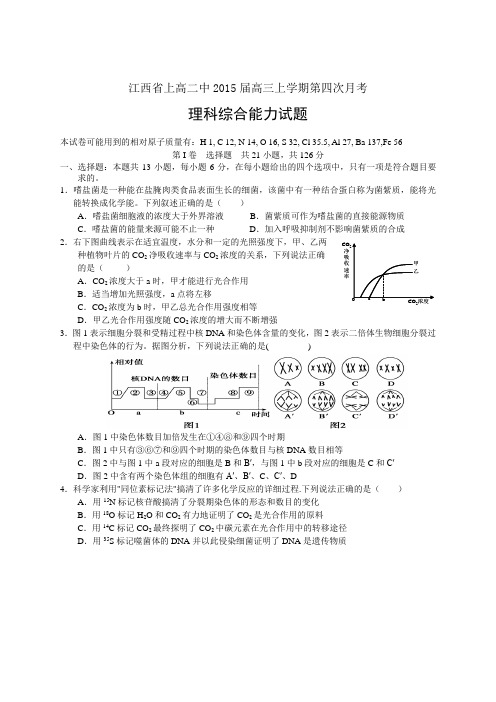
CO 净吸收速率2江西省上高二中2015届高三上学期第四次月考理科综合能力试题本试卷可能用到的相对原子质量有:H 1, C 12, N 14, O 16, S 32, Cl 35.5, Al 27, Ba 137,Fe 56第I 卷 选择题 共21小题,共126分一、选择题:本题共13小题,每小题6分,在每小题给出的四个选项中,只有一项是符合题目要求的。
1.嗜盐菌是一种能在盐腌肉类食品表面生长的细菌,该菌中有一种结合蛋白称为菌紫质,能将光能转换成化学能。
下列叙述正确的是( )A .嗜盐菌细胞液的浓度大于外界溶液B .菌紫质可作为嗜盐菌的直接能源物质C .嗜盐菌的能量来源可能不止一种D .加入呼吸抑制剂不影响菌紫质的合成2.右下图曲线表示在适宜温度,水分和一定的光照强度下,甲、乙两 种植物叶片的CO 2净吸收速率与CO 2浓度的关系,下列说法正确 的是( ) A .CO 2浓度大于a 时,甲才能进行光合作用B .适当增加光照强度,a 点将左移C .CO 2浓度为b 时,甲乙总光合作用强度相等D .甲乙光合作用强度随CO 2浓度的增大而不断增强3.图1表示细胞分裂和受精过程中核DNA 和染色体含量的变化,图2表示二倍体生物细胞分裂过程中染色体的行为。
据图分析,下列说法正确的是( )A .图1中染色体数目加倍发生在①④⑧和⑨四个时期B .图1中只有③⑥⑦和⑨四个时期的染色体数目与核DNA 数目相等C .图2中与图1中a 段对应的细胞是B 和B′,与图1中b 段对应的细胞是C 和C′D .图2中含有两个染色体组的细胞有A′、B′、C 、C′、D4.科学家利用"同位素标记法"搞清了许多化学反应的详细过程.下列说法正确的是( )A .用15N 标记核苷酸搞清了分裂期染色体的形态和数目的变化B .用18O 标记H 2O 和CO 2有力地证明了CO 2是光合作用的原料C .用14C 标记CO 2最终探明了CO 2中碳元素在光合作用中的转移途径D .用35S 标记噬菌体的DNA 并以此侵染细菌证明了DNA 是遗传物质5.豌豆素是野生型豌豆产生的一种抵抗真菌侵染的化学物质,决定产生豌豆素的基因A对a为显性,基因B对豌豆素的产生有抑制作用,而b基因没有。
江西省上高二中2018届高三上学期第四次月考试卷英语 Word版含答案
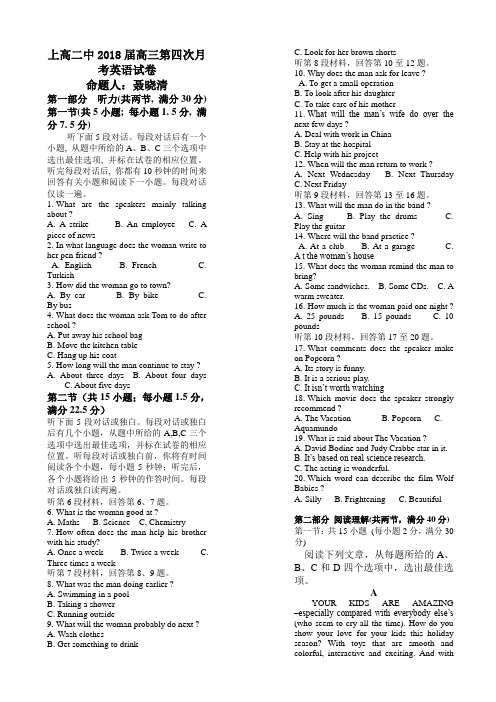
上高二中2018届高三第四次月考英语试卷命题人:聂晓清第一部分听力(共两节, 满分30分) 第一节(共5小题; 每小题1. 5分, 满分7. 5分)听下面5段对话。
每段对话后有一个小题, 从题中所给的A、B、C三个选项中选出最佳选项, 并标在试卷的相应位置。
听完每段对话后, 你都有10秒钟的时间来回答有关小题和阅读下一小题。
每段对话仅读一遍。
1.What are the speakers mainly talking about ?A. A strikeB. An employeeC. A piece of news2.In what language does the woman write to her pen friend ?A. EnglishB. FrenchC. Turkish3.How did the woman go to town?A. By carB. By bikeC. By bus4.What does the woman ask Tom to do after school ?A. Put away his school bagB. Move the kitchen tableC. Hang up his coat5.How long will the man continue to stay ?A. About three daysB. About four daysC. About five days第二节(共15小题;每小题1.5分,满分22.5分)听下面5段对话或独白。
每段对话或独白后有几个小题,从题中所给的A,B,C三个选项中选出最佳选项,并标在试卷的相应位置。
听每段对话或独白前,你将有时间阅读各个小题,每小题5秒钟;听完后,各个小题将给出5秒钟的作答时间。
每段对话或独白读两遍。
听第6段材料,回答第6、7题。
6.What is the woman good at ?A. MathsB. Science C, Chemistry7.How often does the man help his brother with his study?A. Once a weekB. Twice a weekC. Three times a week听第7段材料,回答第8、9题。
江西省上高二中高三上学期第四次月考试卷英语Word版含答案
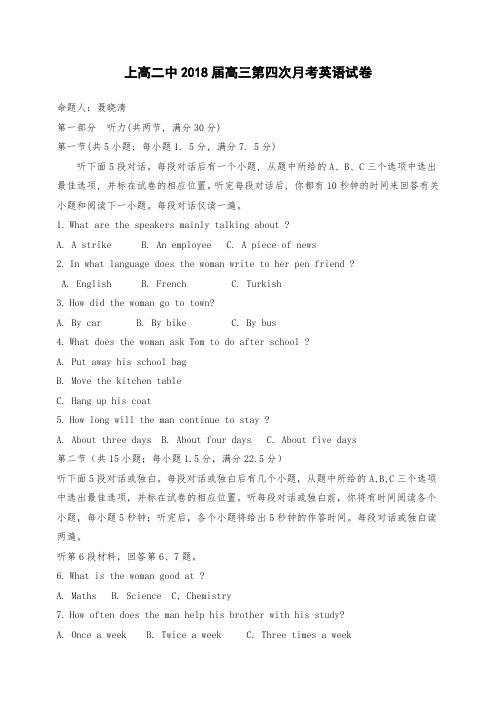
上高二中2018届高三第四次月考英语试卷命题人:聂晓清第一部分听力(共两节, 满分30分)第一节(共5小题; 每小题1. 5分, 满分7. 5分)听下面5段对话。
每段对话后有一个小题, 从题中所给的A、B、C三个选项中选出最佳选项, 并标在试卷的相应位置。
听完每段对话后, 你都有10秒钟的时间来回答有关小题和阅读下一小题。
每段对话仅读一遍。
1.What are the speakers mainly talking about ?A. A strikeB. An employeeC. A piece of news2.In what language does the woman write to her pen friend ?A. EnglishB. FrenchC. Turkish3.How did the woman go to town?A. By carB. By bikeC. By bus4.What does the woman ask Tom to do after school ?A. Put away his school bagB. Move the kitchen tableC. Hang up his coat5.How long will the man continue to stay ?A. About three daysB. About four daysC. About five days第二节(共15小题;每小题1.5分,满分22.5分)听下面5段对话或独白。
每段对话或独白后有几个小题,从题中所给的A,B,C三个选项中选出最佳选项,并标在试卷的相应位置。
听每段对话或独白前,你将有时间阅读各个小题,每小题5秒钟;听完后,各个小题将给出5秒钟的作答时间。
每段对话或独白读两遍。
听第6段材料,回答第6、7题。
6.What is the woman good at ?A. MathsB. Science C, Chemistry7.How often does the man help his brother with his study?A. Once a weekB. Twice a weekC. Three times a week听第7段材料,回答第8、9题。
江西省南昌市第二中学2015届高三上学期第四次月考英语试卷
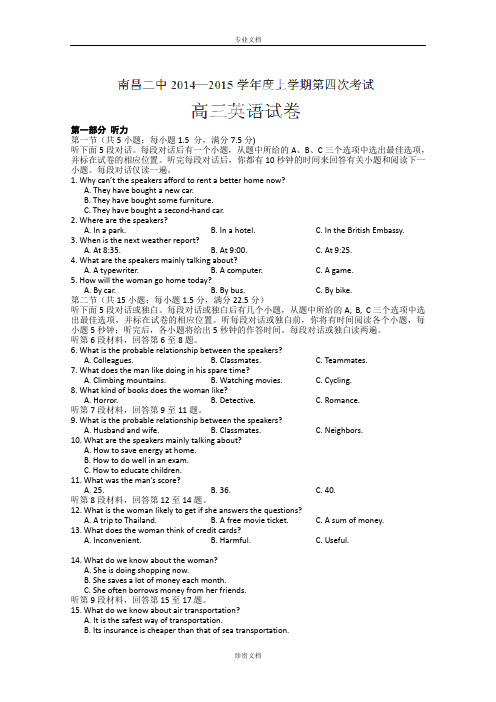
第一部分听力第一节(共5小题;每小题1.5 分,满分7.5分)听下面5段对话。
每段对话后有一个小题,从题中所给的A、B、C三个选项中选出最佳选项,并标在试卷的相应位置。
听完每段对话后,你都有10秒钟的时间来回答有关小题和阅读下一小题。
每段对话仅读一遍。
1. Why can’t the speakers afford to rent a better home now?A. They have bought a new car.B. They have bought some furniture.C. They have bought a second-hand car.2. Where are the speakers?A. In a park.B. In a hotel.C. In the British Embassy.3. When is the next weather report?A. At 8:35.B. At 9:00.C. At 9:25.4. What are the speakers mainly talking about?A. A typewriter.B. A computer.C. A game.5. How will the woman go home today?A. By car.B. By bus.C. By bike.第二节(共15小题;每小题1.5分,满分22.5分)听下面5段对话或独白。
每段对话或独白后有几个小题,从题中所给的A, B, C三个选项中选出最佳选项,并标在试卷的相应位置。
听每段对话或独白前,你将有时间阅读各个小题,每小题5秒钟;听完后,各小题将给出5秒钟的作答时间。
每段对话或独白读两遍。
听第6段材料,回答第6至8题。
6. What is the probable relationship between the speakers?A. Colleagues.B. Classmates.C. Teammates.7. What does the man like doing in his spare time?A. Climbing mountains.B. Watching movies.C. Cycling.8. What kind of books does the woman like?A. Horror.B. Detective.C. Romance.听第7段材料,回答第9至11题。
江西省上高二中2015届高三上学期第五次月考英语试题及答案
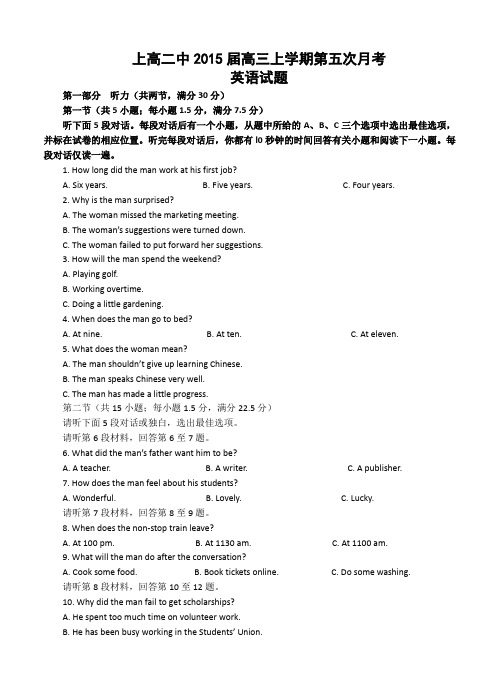
上高二中2015届高三上学期第五次月考英语试题第一部分听力(共两节,满分30分)第一节(共5小題;每小题1.5分,满分7.5分)听下面5段对话。
每段对话后有一个小题,从题中所给的A、B、C三个选项中选出最佳选项,并标在试卷的相应位置。
听完每段对话后,你都有l0秒钟的时间回答有关小题和阅读下一小题。
每段对话仅读一遍。
1. How long did the man work at his first job?A. Six years.B. Five years.C. Four years.2. Why is the man surprised?A. The woman missed the marketing meeting.B. The woman’s suggestions were turned down.C. The woman failed to put forward her suggestions.3. How will the man spend the weekend?A. Playing golf.B. Working overtime.C. Doing a little gardening.4. When does the man go to bed?A. At nine.B. At ten.C. At eleven.5. What does the woman mean?A. The man shouldn’t give up le arning Chinese.B. The man speaks Chinese very well.C. The man has made a little progress.第二节(共15小题;每小题1.5分,满分22.5分)请听下面5段对话或独白,选出最佳选项。
请听第6段材料,回答第6至7题。
6. What did the man’s father want him to be?A. A teacher.B. A writer.C. A publisher.7. How does the man feel about his students?A. Wonderful.B. Lovely.C. Lucky.请听第7段材料,回答第8至9题。
江西省届高三英语上学期第四次月考试题(含解析)
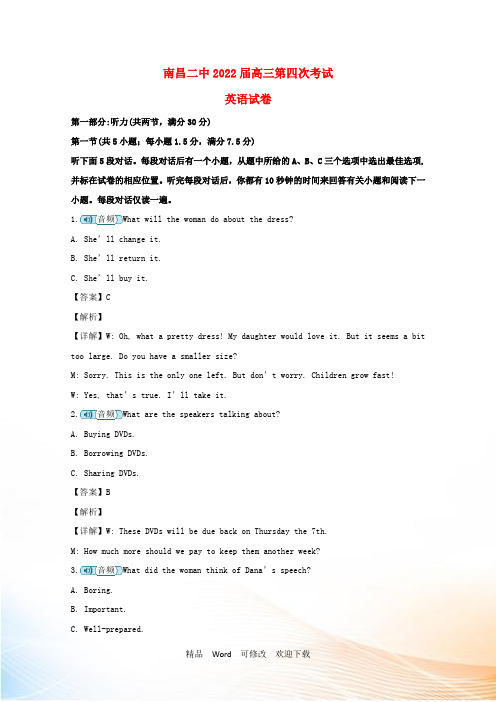
南昌二中2022届高三第四次考试英语试卷第一部分:听力(共两节,满分30分)第一节(共5小题;每小题1.5分,满分7.5分)听下面5段对话。
每段对话后有一个小题,从题中所给的A、B、C三个选项中选出最佳选项,并标在试卷的相应位置。
听完每段对话后,你都有10秒钟的时间来回答有关小题和阅读下一小题。
每段对话仅读一遍。
1.音频What will the woman do about the dress?A. She’ll change it.B. She’ll return it.C. She’ll buy it.【答案】C【解析】【详解】W: Oh, what a pretty dress! My daughter would love it. But it seems a bit too large. Do you have a smaller size?M: Sorry. This is the only one left. But don’t worry. Children grow fast!W: Yes, that’s true. I’ll take it.2.音频What are the speakers talking about?A. Buying DVDs.B. Borrowing DVDs.C. Sharing DVDs.【答案】B【解析】【详解】W: These DVDs will be due back on Thursday the 7th.M: How much more should we pay to keep them another week?3.音频What did the woman think of Dana’s sp eech?A. Boring.B. Important.C. Well-prepared.【答案】C【解析】【详解】M: What did you think of Dana’s speech today?W: Well, she must have spent a lot of time preparing it. I can’t believe I could sit for that long without feeling bored.4.音频What does the man mean?A. He is unable to give help.B. He will carry the boxes later.C. He refuses to pay for boxes.【答案】A【解析】【详解】W: Could you help us carry these boxes, sir?M: Oh, I’d like to help you, but I’ve got a pain in my back.5.音频When is Simon supposed to arrive?A. 7:30.B. 8:00.C. 8:10.【答案】B【解析】【详解】W: I wonder if Simon will be here by 8. He’s supposed to be.M: His wife said he left at 7:30, so he should be here by 8:10 at the latest.第二节(共15小题,每小题1.5分,满分22.5分)听下面5段对话或独白。
江西省上高二中2015届高三上学期第一次月考 英语 Word版含答案
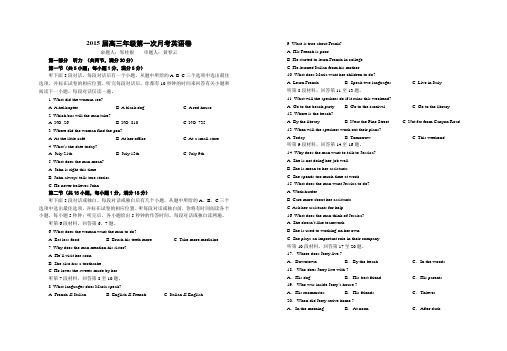
2015届高三年级第一次月考英语卷命题人:邹桂根审题人:黄春云第一部分听力(共两节,满分30分)第一节(共5小题;每小题1分,满分5分)听下面5段对话。
每段对话后有一个小题,从题中所给的A. B. C三个选项中选出最佳选项,并标在试卷的相应位置。
听完每段对话后,你都有10秒钟的时间来回答有关小题和阅读下一小题。
每段对话仅读一遍。
1. What did the woman see?A. A helicopterB. A black dogC. A red house2. Which bus will the man take?A. NO. 26B. NO. 810C. NO. 7353. Where did the woman find the pen?A. At the little caféB. At her officeC. At a small store4. What‟s the date today?A. July 21thB. July 15thC. July 9th5. What does the man mean?A. John is right this timeB. John always tells true storiesC. He never believes John第二节(共15小题,每小题1分,满分15分)听下面5段对话或独白。
每段对话或独白后有几个小题,从题中所给的A、B、C三个选项中选出最佳选项,并标在试卷的相应位置。
听每段对话或独白前,你将有时间阅读各个小题,每小题5秒钟;听完后,各小题给出5秒钟的作答时间。
每段对话或独白读两遍。
听第6段材料,回答第6、7题。
6. What does the woman want the man to do?A. Eat less foodB. Brush his teeth moreC. Take more medicine7. Why does the man mention his sister?A. He‟ll visit her soon.B. She also has a toothache.C. He loves the sweets made by her.听第7段材料,回答第8至10题。
高三英语第四次月考模拟测试卷及答案
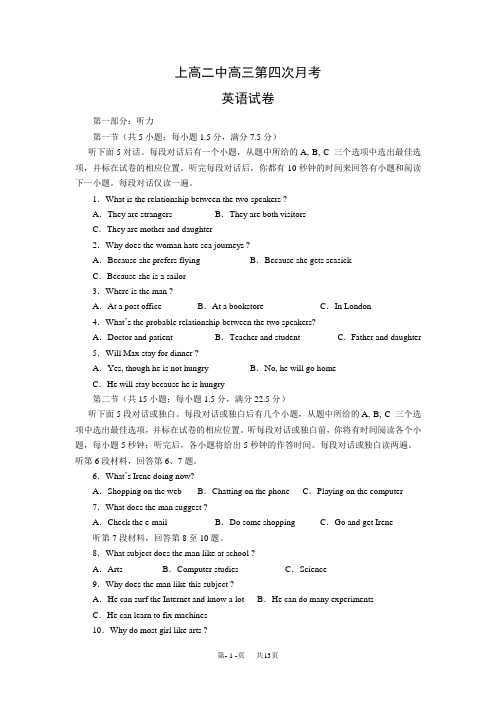
上高二中高三第四次月考英语试卷第一部分:听力第一节(共5小题;每小题1.5分,满分7.5分)听下面5对话。
每段对话后有一个小题,从题中所给的A, B, C 三个选项中选出最佳选项,并标在试卷的相应位置。
听完每段对话后,你都有10秒钟的时间来回答有小题和阅读下一小题。
每段对话仅读一遍。
1.What is the relationship between the two speakers ?A.They are strangers B.They are both visitorsC.They are mother and daughter2.Why does the woman hate sea journeys ?A.Because she prefers flying B.Because she gets seasickC.Because she is a sailor3.Where is the man ?A.At a post office B.At a bookstore C.In London4.What’s the probable relationship between the two speakers?A.Doctor and patient B.Teacher and student C.Father and daughter 5.Will Max stay for dinner ?A.Yes, though he is not hungry B.No, he will go homeC.He will stay because he is hungry第二节(共15小题;每小题1.5分,满分22.5分)听下面5段对话或独白。
每段对话或独白后有几个小题,从题中所给的A, B, C 三个选项中选出最佳选项,并标在试卷的相应位置。
听每段对话或独白前,你将有时间阅读各个小题,每小题5秒钟;听完后,各小题将给出5秒钟的作答时间。
江西省上高二中2017-2018学年高一第一学期第四次月考英语试卷
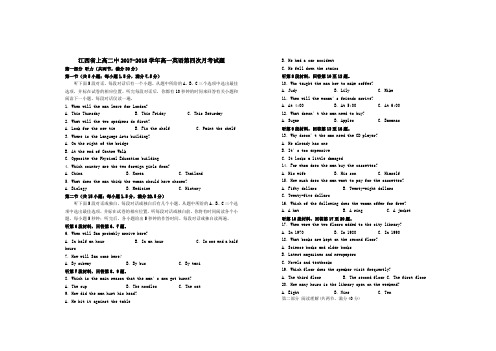
江西省上高二中2017-2018学年高一英语第四次月考试题第一部分听力(共两节,满分30分)第一节(共5小题;每小题1.5分,满分7.5分)听下面5段对话。
每段对话后有一个小题,从题中所给的A、B、C三个选项中选出最佳选项,并标在试卷的相应位置。
听完每段对话后,你都有10秒钟的时间来回答有关小题和阅读下一小题。
每段对话仅读一遍。
1.When will the man leave for London?A.This Thursday B.This Friday C.This Saturday 2.What will the two speakers do first?A.Look for the new tie B.Fix the shelf C.Paint the shelf 3.Where is the Language Arts building?A.On the right of the bridgeB.At the end of Centre WalkC.Opposite the Physical Education building4.Which country are the two foreign girls from?A.China B.Korea C.Thailand5.What does the man think the woman should have chosen?A.Biology B.Medicine C.History第二节(共15小题;每小题1.5分,满分22.5分)听下面5段对话或独白。
每段对话或独白后有几个小题,从题中所给的A、B、C三个选项中选出最佳选项,并标在试卷的相应位置,听每段对话或独白前,你将有时间阅读各个小题。
每小题5秒钟;听完后,各小题给出5秒钟的作答时间。
每段对话或独白读两遍。
听第6段材料,回答第6、7题。
6.When will Sam probably arrive here?A.In half an hour B.In an hour C.In one end a half hours7.How will Sam come here?A.By subway B.By bus C.By taxi听第7段材料,回答第8、9题。
江西省上高二中2015届高三第十次月考英语试题及答案
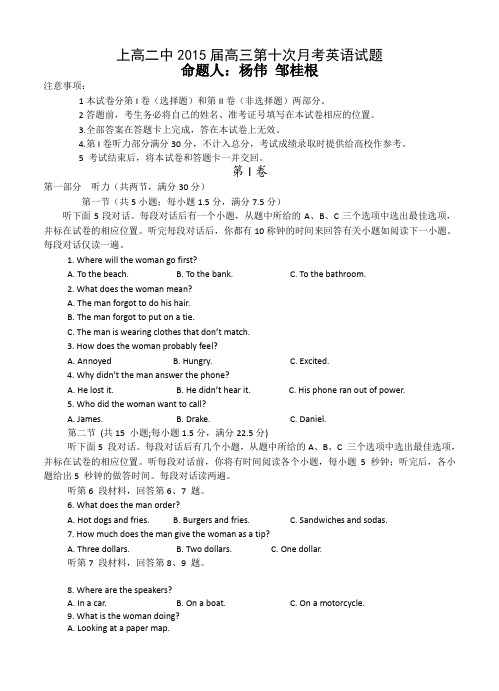
上高二中2015届高三第十次月考英语试题命题人:杨伟邹桂根注意事项:1本试卷分第I卷(选择题)和第II卷(非选择题)两部分。
2答题前,考生务必将自己的姓名、准考证号填写在本试卷相应的位置。
3.全部答案在答题卡上完成,答在本试卷上无效。
4.第I卷听力部分满分30分,不计入总分,考试成绩录取时提供给高校作参考。
5 考试结束后,将本试卷和答题卡一并交回。
第I卷第一部分听力(共两节,满分30分)第一节(共5小题;每小题1.5分,满分7.5分)听下面5段对话。
每段对话后有一个小题,从题中所给的A、B、C三个选项中选出最佳选项,并标在试卷的相应位置。
听完每段对话后,你都有10称钟的时间来回答有关小题如阅读下一小题。
每段对话仅读一遍。
1. Where will the woman go first?A. To the beach.B. To the bank.C. To the bathroom.2. What does the woman mean?A. The man forgot to do his hair.B. The man forgot to put on a tie.C. The man is wearing clothes that don’t match.3. How does the woman probably feel?A. AnnoyedB. Hungry.C. Excited.4. Why didn’t the man answer the phone?A. He lost it.B. He didn’t hear it.C. His phone ran out of power.5. Who did the woman want to call?A. James.B. Drake.C. Daniel.第二节(共15 小题;每小题1.5分,满分22.5分)听下面5 段对话。
每段对话后有几个小题,从题中所给的A、B、C 三个选项中选出最佳选项,并标在试卷的相应位置。
江西省上高二中高三英语上学期第四次月考试题
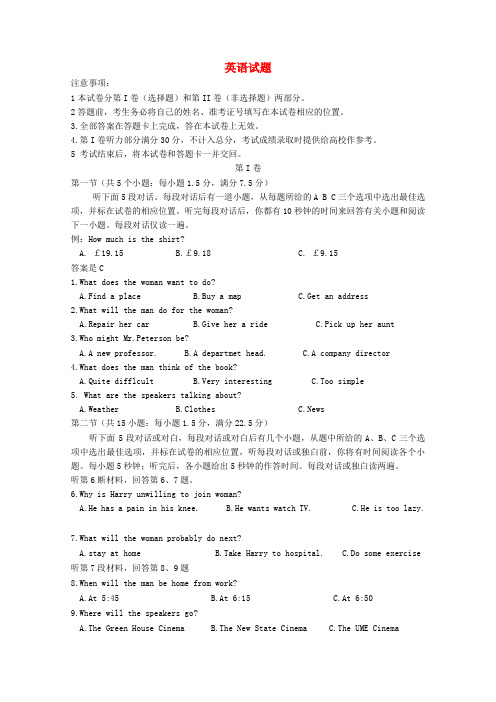
英语试题注意事项:1本试卷分第I卷(选择题)和第II卷(非选择题)两部分。
2答题前,考生务必将自己的姓名、准考证号填写在本试卷相应的位置。
3.全部答案在答题卡上完成,答在本试卷上无效。
4.第I卷听力部分满分30分,不计入总分,考试成绩录取时提供给高校作参考。
5 考试结束后,将本试卷和答题卡一并交回。
第I卷第一节(共5个小题:每小题1.5分,满分7.5分)听下面5段对话。
每段对话后有一道小题,从每题所给的A B C三个选项中选出最佳选项,并标在试卷的相应位置。
听完每段对话后,你都有10秒钟的时间来回答有关小题和阅读下一小题。
每段对话仅读一遍。
例:How much is the shirt?A. £19.15B.£9.18C. £9.15答案是C1.What does the woman want to do?A.Find a placeB.Buy a mapC.Get an address2.What will the man do for the woman?A.Repair her carB.Give her a rideC.Pick up her aunt3.Who might Mr.Peterson be?A.A new professor.B.A departmet head.C.A company director4.What does the man think of the book?A.Quite difflcultB.Very interestingC.Too simple5. What are the speakers talking about?A.WeatherB.ClothesC.News第二节(共15小题:每小题1.5分,满分22.5分)听下面5段对话或对白,每段对话或对白后有几个小题,从题中所给的A、B、C三个选项中选出最佳选项,并标在试卷的相应位置,听每段对话或独白前,你将有时间阅读各个小题。
江西省南昌市第二中学2015届高三上第四次月考英语试题及答案
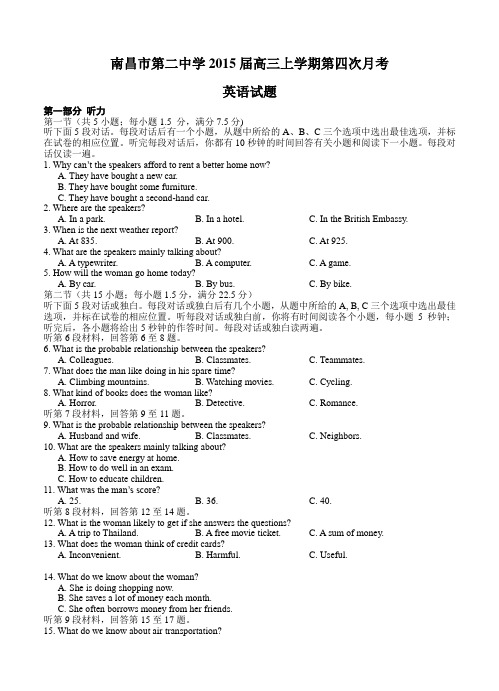
南昌市第二中学2015届高三上学期第四次月考英语试题第一部分听力第一节(共5小题;每小题1.5 分,满分7.5分)听下面5段对话。
每段对话后有一个小题,从题中所给的A、B、C三个选项中选出最佳选项,并标在试卷的相应位置。
听完每段对话后,你都有10秒钟的时间回答有关小题和阅读下一小题。
每段对话仅读一遍。
1. Why can’t the speakers afford to rent a better home now?A. They have bought a new car.B. They have bought some furniture.C. They have bought a second-hand car.2. Where are the speakers?A. In a park.B. In a hotel.C. In the British Embassy.3. When is the next weather report?A. At 835.B. At 900.C. At 925.4. What are the speakers mainly talking about?A. A typewriter.B. A computer.C. A game.5. How will the woman go home today?A. By car.B. By bus.C. By bike.第二节(共15小题;每小题1.5分,满分22.5分)听下面5段对话或独白。
每段对话或独白后有几个小题,从题中所给的A, B, C三个选项中选出最佳选项,并标在试卷的相应位置。
听每段对话或独白前,你将有时间阅读各个小题,每小题5秒钟;听完后,各小题将给出5秒钟的作答时间。
每段对话或独白读两遍。
听第6段材料,回答第6至8题。
6. What is the probable relationship between the speakers?A. Colleagues.B. Classmates.C. Teammates.7. What does the man like doing in his spare time?A. Climbing mountains.B. Watching movies.C. Cycling.8. What kind of books does the woman like?A. Horror.B. Detective.C. Romance.听第7段材料,回答第9至11题。
江西省上高二中高一英语第四次月考试题
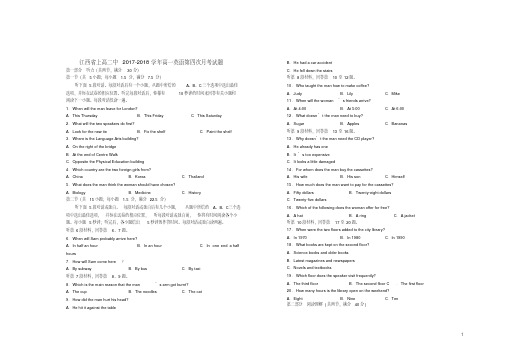
江西省上高二中2017-2018学年高一英语第四次月考试题第一部分听力(共两节,满分30分)第一节(共5小题;每小题 1.5分,满分7.5分)听下面5段对话。
每段对话后有一个小题,从题中所给的A、B、C三个选项中选出最佳选项,并标在试卷的相应位置。
听完每段对话后,你都有10秒钟的时间来回答有关小题和阅读下一小题。
每段对话仅读一遍。
1.When will the man leave for London?A.This Thursday B.This Friday C.This Saturday 2.What will the two speakers do first?A.Look for the new tie B.Fix the shelf C.Paint the shelf 3.Where is the Language Arts building?A.On the right of the bridgeB.At the end of Centre WalkC.Opposite the Physical Education building4.Which country are the two foreign girls from?A.China B.Korea C.Thailand5.What does the man think the woman should have chosen?A.Biology B.Medicine C.History第二节(共15小题;每小题 1.5分,满分22.5分)听下面5段对话或独白。
每段对话或独白后有几个小题,从题中所给的A、B、C三个选项中选出最佳选项,并标在试卷的相应位置,听每段对话或独白前,你将有时间阅读各个小题。
每小题5秒钟;听完后,各小题给出5秒钟的作答时间。
每段对话或独白读两遍。
听第6段材料,回答第6、7题。
6.When will Sam probably arrive here?A.In half an hour B.In an hour C.In one end a half hours7.How will Sam come here?A.By subway B.By bus C.By taxi听第7段材料,回答第8、9题。
江西省宜春市上高二中高三英语上学期第四次月考试题-人教版高二全册英语试题
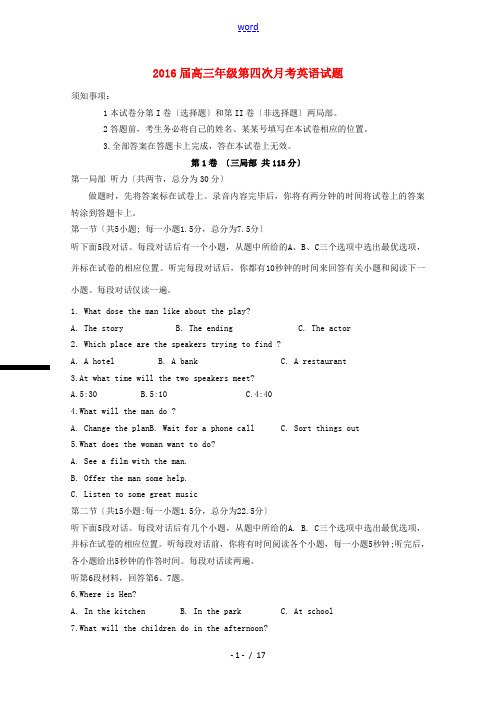
2016届高三年级第四次月考英语试题须知事项:1本试卷分第I卷〔选择题〕和第II卷〔非选择题〕两局部。
2答题前,考生务必将自己的姓名、某某号填写在本试卷相应的位置。
3.全部答案在答题卡上完成,答在本试卷上无效。
第1卷〔三局部共115分〕第一局部听力〔共两节,总分为30分〕做题时,先将答案标在试卷上。
录音内容完毕后,你将有两分钟的时间将试卷上的答案转涂到答题卡上。
第一节〔共5小题; 每一小题1.5分,总分为7.5分〕听下面5段对话。
每段对话后有一个小题,从题中所给的A、B、C三个选项中选出最优选项,并标在试卷的相应位置。
听完每段对话后,你都有10秒钟的时间来回答有关小题和阅读下一小题。
每段对话仅读一遍。
1. What dose the man like about the play?A. The storyB. The endingC. The actor2. Which place are the speakers trying to find ?A. A hotelB. A bankC. A restaurant3.At what time will the two speakers meet?A.5:30B.5:10C.4:404.What will the man do ?A. Change the planB. Wait for a phone callC. Sort things out5.What does the woman want to do?A. See a film with the man.B. Offer the man some help.C. Listen to some great music第二节〔共15小题:每一小题1.5分,总分为22.5分〕听下面5段对话。
每段对话后有几个小题,从题中所给的A. B. C三个选项中选出最优选项,并标在试卷的相应位置。
听每段对话前,你将有时间阅读各个小题,每一小题5秒钟;听完后,各小题给出5秒钟的作答时间。
- 1、下载文档前请自行甄别文档内容的完整性,平台不提供额外的编辑、内容补充、找答案等附加服务。
- 2、"仅部分预览"的文档,不可在线预览部分如存在完整性等问题,可反馈申请退款(可完整预览的文档不适用该条件!)。
- 3、如文档侵犯您的权益,请联系客服反馈,我们会尽快为您处理(人工客服工作时间:9:00-18:30)。
江西省上高二中2015届高三上学期第四次月考英语试题注意事项:1本试卷分第I卷(选择题)和第II卷(非选择题)两部分。
2答题前,考生务必将自己的姓名、准考证号填写在本试卷相应的位置。
3.全部答案在答题卡上完成,答在本试卷上无效。
4.第I卷听力部分满分30分,不计入总分,考试成绩录取时提供给高校作参考。
5 考试结束后,将本试卷和答题卡一并交回。
第I卷第一节(共5个小题:每小题1.5分,满分7.5分)听下面5段对话。
每段对话后有一道小题,从每题所给的A B C三个选项中选出最佳选项,并标在试卷的相应位置。
听完每段对话后,你都有10秒钟的时间来回答有关小题和阅读下一小题。
每段对话仅读一遍。
例:How much is the shirt?A. £19.15B.£9.18C. £9.15答案是C1.What does the woman want to do?A.Find a placeB.Buy a mapC.Get an address2.What will the man do for the woman?A.Repair her carB.Give her a rideC.Pick up her aunt3.Who might Mr.Peterson be?A.A new professor.B.A departmet head.C.A company director4.What does the man think of the book?A.Quite difflcultB.Very interestingC.Too simple5. What are the speakers talking about?A.WeatherB.ClothesC.News第二节(共15小题:每小题1.5分,满分22.5分)听下面5段对话或对白,每段对话或对白后有几个小题,从题中所给的A、B、C三个选项中选出最佳选项,并标在试卷的相应位置,听每段对话或独白前,你将有时间阅读各个小题。
每小题5秒钟;听完后,各小题给出5秒钟的作答时间。
每段对话或独白读两遍。
听第6断材料,回答第6、7题。
6.Why is Harry unwilling to join woman?A.He has a pain in his knee.B.He wants watch TV.C.He is too lazy.7.What will the woman probably do next?A.stay at homeB.Take Harry to hospital.C.Do some exercise听第7段材料,回答第8、9题8.When will the man be home from work?A.At 5:45B.At 6:15C.At 6:509.Where will the speakers go?A.The Green House CinemaB.The New State CinemaC.The UME Cinema听第8段材料,回答第10至12题。
10.How will the speakers go to New York?A.By airB.By taxiC.By bus11.Why are the speakers making the trip?A.For businissB.For shoppingC.For holiday12.What is the probable relationship between the speakers?A.Driver and passengerB.Husband and wifeC. Fellow workers听第9段材料,回答第13至16题。
13.where does this conversation probably take place?A.In a restaurantB.In an officeC.In a classroom14.What does John do now?A.He‟s trainer.B.He‟s a tour guideC.He‟s a college student15.How much can a new person for the first year?A. $10,500B. $12,000C. $15,00016.How many people will the woman hire?A.FourB.ThreeC. Two听第10段材料,回答第17至20题。
17.How long has the speaker lived in a big city?A.One yearB.Ten yearsC.Eighteen years.18.What is the speaker‟s opinion on public transport?A.It‟s comfortableB.It‟s time-savingC.It‟s cheap19.Whay is good about living in a small town?A.It‟s saferB.It‟s healthierC.It‟s more conven ient20.What kind of life does the speakers seem to like most?A.Busy,B.Colourful.C.Quiet第二部分阅读理解(共两节,满分60分)第一节(共15小题;每小题3分,满分45分)阅读下列短文,从每题所给的四个选项(A 、B 、C 和D )中,选出最佳选项,并在题卡上将该项涂黑。
A. The main character in My Left Foot is a prisonerB. The main character in My Left Foot is trapped by othersC. The main character in My Left Foot is a disabled personD. The main character in My Left Foot can‟t control his whole body22. If you want to watch a movie about wars, which may be one of your choices?A. My Left Foot.B. Shine.C. Life Is Beautiful.D. Stand and Deliver.23. What do the four movies have in common?A. They are all based on real stories.B. They are all inspiring stories that make a difference.C. The main characters all won Academy Award for Best Actor.D. The main characters are all sick to some degree but succeed.BChina may be the world‟s largest market for e-bikes, but Europe is fast catching up. The EU‟s official statistics agency says the figure reached the one million e-bike mark two years ago, and sales have sharply increased since then.When working errands (差事) around Berlin, Lutz, who usually works with horses, uses the company‟s new e-bike that charges easily and has a range of 140 kilometers. “We found there was no parking spot problem or other worries. And on top of all this, we don‟t pollute the environm ent. Petrol is also saved,” said Lutz Baddack, owner of Reitsport Baddack.Unlike many other parts of the world, the EU does not require registration (登记) for e-bikes. Nearly half a million are expected to be sold in Germany this year, in all shapes and sizes.It‟s not just bike fans buying them. People who usually drive cars also use them occasionally,” said Stefan Gelbhaar.Dealers say the elderly are also big customers. Sales of ordinary bicycles fell in Germany last year, but sales of e-bikes rose by ei ght percent. Sales figures are expected to keep rising. “In five years we will have the market share of 20 percent, maybe more,” said Marcus Kendler, owner of E-Motion. In the hillier parts, that figure has already been beyond it.The sales of e-bikes in Germany have been much larger than those in any other country in Europe. But other countries are fast catching up. In Europe, with the various brands at the market and falling prices, e-bikes are here to stay and not just a repeated trend.24.In Germany the sales of e-bikes _________.A. have been the biggest in EuropeB. have been larger than in ChinaC. reached one million two years agoD. have taken up 20% of the market25.Which of the following is NOT the benefit of using e-bikes?A. The users n eedn‟t worry about parking spots.B. It‟s environmentally friendly and saves petrol.C. The users are not required to register worldwide.D. It charges easily and runs far without charging.26.From the passage we know that e-bikes are preferred by those _________.A. who work with horsesB. who usually drive carsC. who are out on businessD. who live in the hillier parts27.It can be inferred from the passage that _________.A. the popularity of e-bikes in Europe will be lastingB. in Europe there are various brands of e-bikes on saleC. e-bikes will replace ordinary bicycles in only five yearsD. Europe will become the world‟s largest market of e-bikesCStaying silent can be just as powerful as the words you mean to say, like when the act of hugging will be more comforting than saying, “Sorry for your loss.”Another time when silence is golden is when you are unsure of what to say. If you are confused about your own feelings concerning a matter, it‟s best to stay quiet until you are more certa in because more harm can be done by revealing false or exaggerated feelingsChoose silence instead of blurting out …in-the-moment‟ feelings that are hurtful and not really howyou feel in the grand scheme of things. When you feel the urge to say an unkind thing, take a few breaths and think of the possible consequences of your words.Silence can be your best friend during negotiations. Say your piece, then close your mouth, and let the other person come to their own conclusions. Your silence shows that one, you are confident in what you just said, and two, you respect the other person enough to hear what they have to say.Sometimes silence is the best and most timely solution because the other person is not in a position to hear what you have to say. For example, when a friend needs for you to listen to her problems, but she is unable to accept your advice at that moment.Practice being silent at work when you don‟t have anything meaningful to contribute. Unless you can elevate the conversation by pointing ou t something interesting, missing, or beneficial, it‟s best to just observe and learn.Finally, silence is golden when you don‟t want to engage in a fool‟s argument. As some squabbles(口角) will never be resolved, one must agree to disagree.Hower,there will be times in your life where you will need the power of your voice,the voice within you that wants and needs to be respected and appreciated.28.The passage mainly tells us about ___A.when to stay silentB. why to stay silentC. how to stay silentD. whether or not to stay silent29.What is the best to do during negotiation?A.Grasp every chance to say more than the otherB.Close your mouth and just listen to the otherC. Keep silent after expressing yourselfD. Speak out your own points and discuss with others30.What does the undedined word “elevate” most probably mean?A.startB. concludeC. interruptD. cancel31.To follow this passage,the writer is likely to continue telling about___A.the power of your voiceB.the occasions when you should speak upC.the advantages of speaking upD. the disadvantages of staying silentDJuly 21st. 2007 was a typical English summer‟s day—it rained for 24 hours! As usual, I rushed home from work at midday to check on the house. Nothing was amiss. By the time I left work at 5p.m., however, the road into our village was flooded. Our house had never been flooded but, as I opened the front door, a wave of waters greeted me. Thank God! The kids weren‟t with me, because the house was 5 feet deep in water. We lost everything downstairs. And the plaster had to be torn off the wall‟s ceilings pulled down.At first we tried to push on through. We didn‟t want to move the children out of home. So we camped upstairs. We put a sheet of plastic across the floor to protect us from the damp. But after three months, we felt very sick, so we move to a wooden house in a park. The house was small, but at first we were all just delighted to be in a new place. Unfortunately, things took longer than expected and we were there for 10 months. The life there was inconvenient. What surprised me most was how much I missed being part of a community. We had lived in a friendly village with good neighbors, and I‟d never thought how much I‟d miss that.Al though our situation was very bad, it‟s difficult to feel too sorry for yourself when you look at what‟s happening elsewhere. I watched a news report about floods in Northern India and thought. “We didn‟t have a straw hut(茅草房)that was swept away, and our h ouse is still standing. We‟re lucky.” We moved back home in August. With December coming, there‟s reconstruction work to be done, so it‟s difficult to prepare for Christmas. But I can‟t wait—I‟m going to throw a party for our friends in the village to say thanks for their support. This year, I won‟t need any gifts—living away from home for months has made me realize how little we actually need or miss all our possessions. Although we are replacing things, there‟s really no rush—we have our home back. And th at‟s the main thing.32. What does the underlined word “amiss” in the first paragraph mean?A. Found.B. Missing.C. Right.D. Wrong.33. It can be inferred from the text that the author _________.A. cared much about her childrenB. was sick of staying upstairs aloneC. could not stand living in a wooden houseD. did not deal well with her family affairs during the flood34. Why does the author say that they were lucky in the third paragraph?A. Because her situation was not serious.B. Because some others suffered even more.C. Because she had ever been to Northern India.D. Because very few other places were also flooded.35. What does the author mainly want to express by telling her story?A. She realized she needed no more possession.B. She valued human feelings more than before.C. She found Christmas gifts no longer badly needed.D. She thought her own home was the most important of all.第二节(共5小题;每小题3分,满分15 分)根据短文内容,从短文后的选项中选出能填入空白处的最佳选项。
